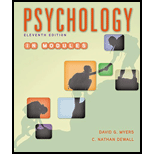
Concept introduction: Biologically, adulthood refers to the stage of total sexual maturity, as per psychology, adulthood depends upon the adult behavior of the person. Adulthood definitions are always inconsistent and contradictory because there are different types of adulthood namely early adulthood (ages in between 30), middle adulthood (ages up to 65), and late adulthood (ages after 65)
Answer to Problem 17TYS
Correct answer: By age 65, a person would be most likely to experience a cognitive decline in the ability to recall and list all the important terms and concepts in a module. Hence, option b. is the correct answer.
Explanation of Solution
Reason for correct statement:
Option a. is given as “recall and list all the important terms and concepts in a module”. At the region of the brain, the limbic region is responsible for memory, and the hippocampus region which is the part of limbic region is responsible for aging. At the age of 65, the blood–brain barrier breaks down at the beginning in the hippocampus region that further leads to cognitive decline. So at this age, a person starts to forget about the things. So at the age of 65, the person starts to recall and list all the important terms and theories in a section. Hence, option a. is the correct answer.
Reasons for incorrect statement:
Option b. is given as “select the correct definition in a multiple-choice question”. At an older age, the person is unable to memorize the theory. But to select the correct definition, the person has to memorize the theory and choose it from the given statements. Hence, option b. is incorrect.
Option c. is given as “recall their own birth date”. The memory about the own birth date is at the conscious portion of our brain. Usually, people do not forget their birth date. Hence, option c. is incorrect.
Option d. is given as, “practice a well-learned skill, such as knitting”. Due to cognitive decline, the person after the age of 65 will be unable to memorize the things, so after practice also the person is unable to do it. Hence, option d. is incorrect.
Hence, option b., c., and d. are incorrect.
Want to see more full solutions like this?
Chapter 17 Solutions
Psychology in Modules
- 1. Explain the main thrust of classical conditioning and operant conditioning theories and their application in Nursing Care. 2. a. Explain how attachment takes place in children using any two attachment theories. 2. b. Explain how development takes place using Bandura’s Social learning and Vygotsky’s Sociocultural theories citing relevant examples.arrow_forwardDaniels, A. C. (2016). Bringing out the best in people: How to apply the astonishing power of positive reinforcement (3rd ed.). What sort of technology has entered your work, that has been touted as something that will make life better or the work more precise – but that you just can’t get the hang of (or that has made work more difficult)?arrow_forwardDaniels, A. C. (2016). Bringing out the best in people: How to apply the astonishing power of positive reinforcement (3rd ed.). Dr. Daniels mentions the Morningside Academy in this chapter. Go to the Academy’s website - http://www.morningsideacademy.org/ Look around the website. What do you see there that, if incorporated into business and industry – and incorporated into training professionals – could help make acquisition of new skills more efficient?arrow_forward
- 1- Select a song: Choose a modern song that you consider has attained classic status. 2- Describe: In 150 words or more, discuss what factors have contributed to this song’s lasting significance. Use the terms discussed above to organize your thoughts and analysis. 3- Add one source: To support your post add a link to an article.arrow_forward1- Select a song: Choose a song that you consider has attained classic status. 2- Describe: In 150 words or more, discuss what factors have contributed to this song’s lasting significance. Use the terms discussed above to organize your thoughts and analysis. 3- Add one source: To support your post add a link to an article.arrow_forwardIdentify one anti-poverty policy and associated program and discuss advantages and limitations of the approach. What opportunities are there to improve the policy and associated program? This is aligned to the following Social Work Competencies: 2: Advance Human Rights and Social, Racial, Economic, and Environmental Justice 5: Engage in Policy Practice Please cite in text source and list referencesarrow_forward
- If you chose to immediately start your treatment with Franklin instead of measuring his anxiety for two weeks prior to starting treatment, what type of SSD design would you be using?arrow_forwardWhat to learn and gained from an experience, what worked, what didn't, when working with behavioral students: societal challenges & opportunities and critical analysis? What changes or adjustments would suggest in working with behavioral student programs?arrow_forwardYour four-year-old continually acts out when you are getting her ready for Sunday morning worship. To punish this behavior and ensure it does not return, what are three factors Domjan discusses to ensure her behavior is altered? Domjan discusses three factors to ensure that behavior is altered or lasting.arrow_forward
 Ciccarelli: Psychology_5 (5th Edition)PsychologyISBN:9780134477961Author:Saundra K. Ciccarelli, J. Noland WhitePublisher:PEARSON
Ciccarelli: Psychology_5 (5th Edition)PsychologyISBN:9780134477961Author:Saundra K. Ciccarelli, J. Noland WhitePublisher:PEARSON Cognitive PsychologyPsychologyISBN:9781337408271Author:Goldstein, E. Bruce.Publisher:Cengage Learning,
Cognitive PsychologyPsychologyISBN:9781337408271Author:Goldstein, E. Bruce.Publisher:Cengage Learning, Introduction to Psychology: Gateways to Mind and ...PsychologyISBN:9781337565691Author:Dennis Coon, John O. Mitterer, Tanya S. MartiniPublisher:Cengage Learning
Introduction to Psychology: Gateways to Mind and ...PsychologyISBN:9781337565691Author:Dennis Coon, John O. Mitterer, Tanya S. MartiniPublisher:Cengage Learning Psychology in Your Life (Second Edition)PsychologyISBN:9780393265156Author:Sarah Grison, Michael GazzanigaPublisher:W. W. Norton & Company
Psychology in Your Life (Second Edition)PsychologyISBN:9780393265156Author:Sarah Grison, Michael GazzanigaPublisher:W. W. Norton & Company Cognitive Psychology: Connecting Mind, Research a...PsychologyISBN:9781285763880Author:E. Bruce GoldsteinPublisher:Cengage Learning
Cognitive Psychology: Connecting Mind, Research a...PsychologyISBN:9781285763880Author:E. Bruce GoldsteinPublisher:Cengage Learning Theories of Personality (MindTap Course List)PsychologyISBN:9781305652958Author:Duane P. Schultz, Sydney Ellen SchultzPublisher:Cengage Learning
Theories of Personality (MindTap Course List)PsychologyISBN:9781305652958Author:Duane P. Schultz, Sydney Ellen SchultzPublisher:Cengage Learning





